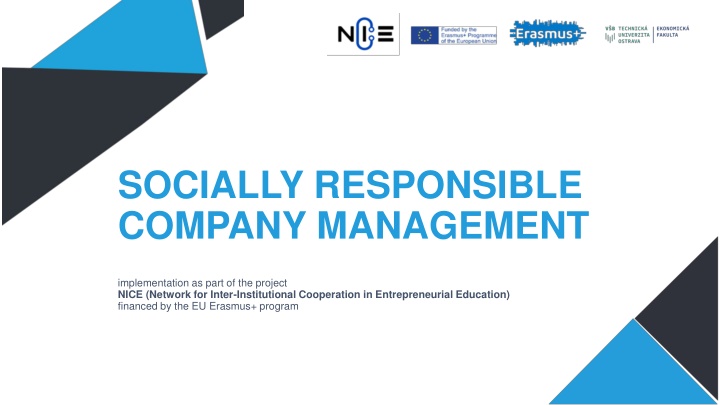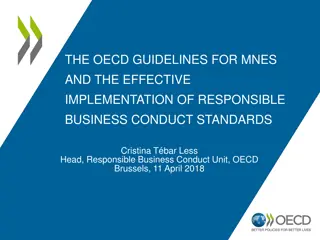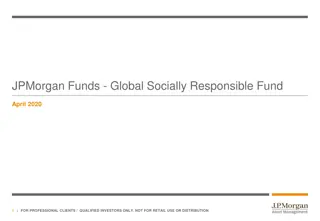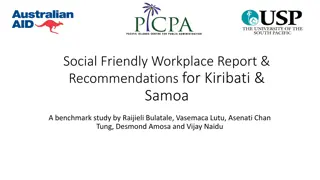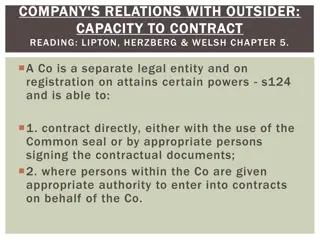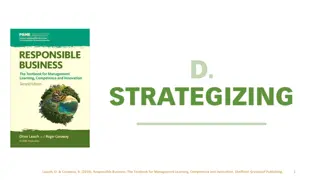Implementing Socially Responsible Company Management for Sustainable Business Growth
Corporate Social Responsibility (CSR) is a voluntary concept where organizations consider social interests, environmental protection, and stakeholder relationships in strategy building. By investing in human resources, environmental protection, and stakeholder relations, companies can enhance their effectiveness and sustainability. The changing state-business relationship and the growing potential of businesses to address societal needs have led to the evolution of CSR as a crucial aspect of modern business practices.
Download Presentation

Please find below an Image/Link to download the presentation.
The content on the website is provided AS IS for your information and personal use only. It may not be sold, licensed, or shared on other websites without obtaining consent from the author.If you encounter any issues during the download, it is possible that the publisher has removed the file from their server.
You are allowed to download the files provided on this website for personal or commercial use, subject to the condition that they are used lawfully. All files are the property of their respective owners.
The content on the website is provided AS IS for your information and personal use only. It may not be sold, licensed, or shared on other websites without obtaining consent from the author.
E N D
Presentation Transcript
SOCIALLY RESPONSIBLE COMPANY MANAGEMENT implementation as part of the project NICE (Network for Inter-Institutional Cooperation in Entrepreneurial Education) financed by the EU Erasmus+ program
Definition Corporate Social Responsibility (CSR) - a concept according to which enterprises voluntarily take into account social interests and environmental protection, as well as relationships with various stakeholder groups, at the stage of strategy building.
CSR According to this approach, being responsible does not only mean that business organizations (enterprises) meet all formal and legal requirements, but also increases investment in human resources, environmental protection and relations with stakeholders who may have an actual impact on the effectiveness of the business activities of these companies. organization.
Where did CSR come from? The changing state-business relationship. The potential of business to meet the needs of the population is growing (privatization) 800 companies from outside the financial sector have an economic result comparable to 144 countries in the world Of the 100 largest economic entities in the world, 51 are corporations (Institute for Policy Studies 2002) No problem of the modern world can be solved without business and its know-how HIV/AIDS, malaria, famine, global warming etc. New management concepts e.g. through leadership. Development of science about business ethics and sustainable development
CSR Main areas of CSR activity: Scope of economic activities: competitiveness, honesty and transparency when concluding contracts, supplier chain management, impact of the economy on society, etc.
CSR Scope of environmental activities: environmental safety during production (damage, accidents, risk), substance emission control, use of renewable and non-renewable resources, distribution, product and service design
CSR Scope of social activities: internal social progress (in terms of human and labor rights, pension security, employee safety and security, respect for labor standards, and equal opportunities) external social progress (corporation and community needs and their perception, neighborhood initiatives)
CSR Scope of corporate governance: protecting the rights of shareholders and investors in corporations, establishing codes of conduct for business, reducing corruption in corporations and government, and maintaining transparency and accountability in corporate governance decision-making.
CSR Employees - organization of integration events for employees and their families; extended scope of occupational health and safety activities; investments in employee competences (training) Customers and consumers - extended scope of product warranty; product marking; discounts and preferential prices
CSR Environmental protection - implementation of an environmental management system and participation in competitions; recycling; efficient use of energy Local communities - sponsorship and patronage (sports, culture, health care); support in the form of transfer of goods and services offered by the company (construction, accounting, internet services, etc.); internships and apprenticeships for young people
Definition Stakeholders - entities (individuals, communities, institutions, organizations, offices) that can influence the enterprise and are influenced by its activities.
Benefits of CSR 1. Better market position gaining a competitive advantage. Responsible companies enjoy a good reputation and perform better compared to their competitors. Customers and consumers appreciate it, are more loyal to a responsible brand and trust it. It is also easier to acquire business partners and capital. Ordering parties often place high demands on their subcontractors in terms of environmental protection, quality and occupational health and safety - here the lack of specific standards may even result in exclusion from the market.
Benefits of CSR 2. Better use of resources, including staff. Companies operating according to the sustainable business model strive to reduce the energy and material consumption of production and services, limiting the costs of energy and material consumption, water consumption, waste disposal, and thus measurably increasing the profitability of their operations. Employees who feel good in their own company are obviously more motivated, which can lead to greater commitment and performance. They also think about changing jobs less often. Employees, especially highly qualified ones, are more willing to work in companies that enjoy a reputation as good employers.
Global Compact The Global Compact is a purely voluntary initiative with two goals: integrating the 10 principles into business activities around the world, and stimulating action in support of UN goals.
Global Compact The Global Compact calls on companies to adopt, support and decree, within their scope of operations, a set of core values in the areas of human rights, labor standards, the environment and the fight against corruption: Principle 1: Companies should support and respect the protection of proclaimed international human rights; and Principle Principle 2: Ensure they are not involved in human rights violations.
Global Compact Principle 3: Companies should support freedom of association and real recognition of the right to negotiate collective agreements; Principle 4: Elimination of all forms of forced and compulsory labor; Principle 5: Effective abolition of child labor; Principle 6: Elimination of discrimination in employment and occupation.
Global Compact Principle 7: Companies should support a prevention-based approach to environmental challenges; Principle 8: Take initiatives to promote greater environmental responsibility; Principle 9: Encourage the development and dissemination of environmentally friendly technologies. Principle 10: Companies should act against all forms of corruption, including extortion and bribery.
ISO 26 000 standard What does the ISO 26 000 standard include? provides guidelines on social responsibility that can be applied voluntarily by all organizations it does not contain requirements and is not intended to be used for certification purposes
ISO 26 000 standard ISO 26 000 is a standard that provides guidelines for social responsibility. It does not contain requirements and is not intended or appropriate to be used for certification purposes.
SA 8000 standard The SA 8000 (Social Accountability 8000) standard is a universal standard specifying the social responsibility requirements that an enterprise should meet. The standard refers to ISO quality standards. The main reason for creating the possibility of verifying the principles of social responsibility was the dissatisfaction of customers and employees around the world, resulting from the contradiction between the values and principles proclaimed by companies and everyday practice.
SA 8000 standard Children's work. It is prohibited to use child labor in the company, i.e. persons who (according to Polish regulations) are under 16 years of age, and if this type of work is used, the organization should take all necessary measures to ensure that children have the opportunity for proper development. Forced labor. The use of forced labor, i.e. employing people on terms that prevent the employee from voluntarily terminating the employment relationship, is prohibited. Staff must not be forced to provide deposits or identification when taking up employment with the company.
SA 8000 standard Health and safety. The company must provide a safe and healthy working environment. This refers to the applicable Occupational Health and Safety regulations. The entrepreneur must take appropriate steps to prevent accidents and damage to health by minimizing the causes of hazards related to the work environment. It is necessary to appoint a person who supervises all health and safety issues and is responsible for the company's compliance with all related legal requirements.
SA 8000 standard Freedom of association and the right to collective bargaining. Polish law allows the creation of all types of employee organizations. Therefore, the employer should respect this right, and employees should be provided with the freedom and freedom to join such associations. Discrimination. Discrimination in any form is prohibited. The Company cannot apply or support discrimination in hiring and firing, remuneration, access to training, promotion opportunities and pensions on the basis of race, nationality, religion, disability, gender, sexual orientation, trade union membership or party affiliation.
SA 8000 standard Disciplinary penalties. The Company must not use or support the use of corporal punishment, mental or psychological coercion, or offensive language. Work hours. Here, Polish legislation (Labour Code) applies to the greatest extent. Weekly working hours should not exceed those specified in the Code. Similarly with regard to overtime work.
SA 8000 standard Salary. For full-time work, the employee is guaranteed remuneration at least the national minimum wage. Moreover, the entrepreneur ensures that no forms of employment of permanent employees on terms other than an employment contract will be used, the purpose of which is to avoid the company's fulfillment of its obligations towards its employees resulting from the relevant acts and regulations regulating social security issues.
Code of ethics - definition Code of ethics not being law, but a written set of rules that a reliable entrepreneur should follow a set of core values and standards of conduct of the company and its employees (often very detailed) based on them towards various stakeholder groups. The content of a given company's code of ethics depends on many internal and external factors.
Helpful website: Forum Odpowiedzialnego Biznesu (Responsible Business Forum) http://www.fob.org.pl
